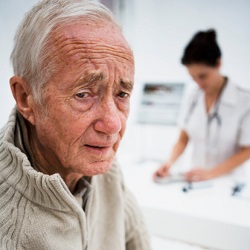 Brain stimulation such as electroconvulsive therapy (ECT) and transcranial magnetic stimulation (TMS) can be highly effective at treating depression, with ECT boasting an improvement rate as high as 90%. But these treatments can be expensive, typically take several weeks to work, and ECT, in particular, has been associated with significant potential side effects—rendering these treatments a last resort for people with depression who have tried everything else. New research points toward an alternative. Low field magnetic stimulation (LFMS) may offer more rapid results.
Brain stimulation such as electroconvulsive therapy (ECT) and transcranial magnetic stimulation (TMS) can be highly effective at treating depression, with ECT boasting an improvement rate as high as 90%. But these treatments can be expensive, typically take several weeks to work, and ECT, in particular, has been associated with significant potential side effects—rendering these treatments a last resort for people with depression who have tried everything else. New research points toward an alternative. Low field magnetic stimulation (LFMS) may offer more rapid results.
What Is Low Field Magnetic Stimulation?
Mental health professionals still don’t fully understand why brain stimulation treatments work, but research overwhelmingly points to their effectiveness. It may be that brain stimulation somehow “resets” the brain, changing the number of neurotransmitters and their effectiveness at undoing brain problems that lead to depression.
Low field magnetic stimulation works on the same basic principle as ECT and TMS. LFMS relies on magnetic fields instead of electricity. Even though the magnetic fields are much weaker than the electrical currents of ECT, they’re delivered at a higher frequency. This higher frequency could cause LFMS to work more quickly than other treatments.
Research on Low Field Magnetic Stimulation
A new study evaluated the effectiveness of LFMS by administering LFMS or a fake LFMS treatment to 63 people with depression. Both treatments lasted 20 minutes, and neither study participants nor researchers knew whether they received the real treatment or the placebo. People who underwent real LFMS treatments saw an immediate and significant improvement in their moods.
The study’s authors emphasize that LFMS could be a good tool for treating “emergency” cases, such as those where a person has threatened suicide or needs immediate psychiatric hospitalization. They also point to the need for further research, particularly surrounding the effects of multiple LFMS treatments.
References:
- Electroconvulsive therapy (ECT). (n.d.). National Alliance on Mental Illness. Retrieved from http://www.nami.org/Template.cfm?Section=About_Treatments_and_Supports&Template=/ContentManagement/ContentDisplay.cfm&ContentID=142939
- Michael L. Rohan, Rinah T. Yamamoto, Caitlin T. Ravichandran, Kenroy R. Cayetano, Oscar G. Morales, David P. Olson, Gordana Vitaliano, Steven M. Paul, Bruce M. Cohen. Rapid Mood-Elevating Effects of Low Field Magnetic Stimulation in Depression. Biological Psychiatry, 2014; 76 (3): 186 DOI:10.1016/j.biopsych.2013.10.024
- Shah, T. (2014, July 23). Low field magnetic stimulation may offer immediate relief for patients with depression. Tech Times. Retrieved from http://www.techtimes.com/articles/11002/20140723/low-field-magnetic-stimulation-may-offer-immediate-relief-for-patients-with-depression.htm

The preceding article was solely written by the author named above. Any views and opinions expressed are not necessarily shared by GoodTherapy.org. Questions or concerns about the preceding article can be directed to the author or posted as a comment below.



